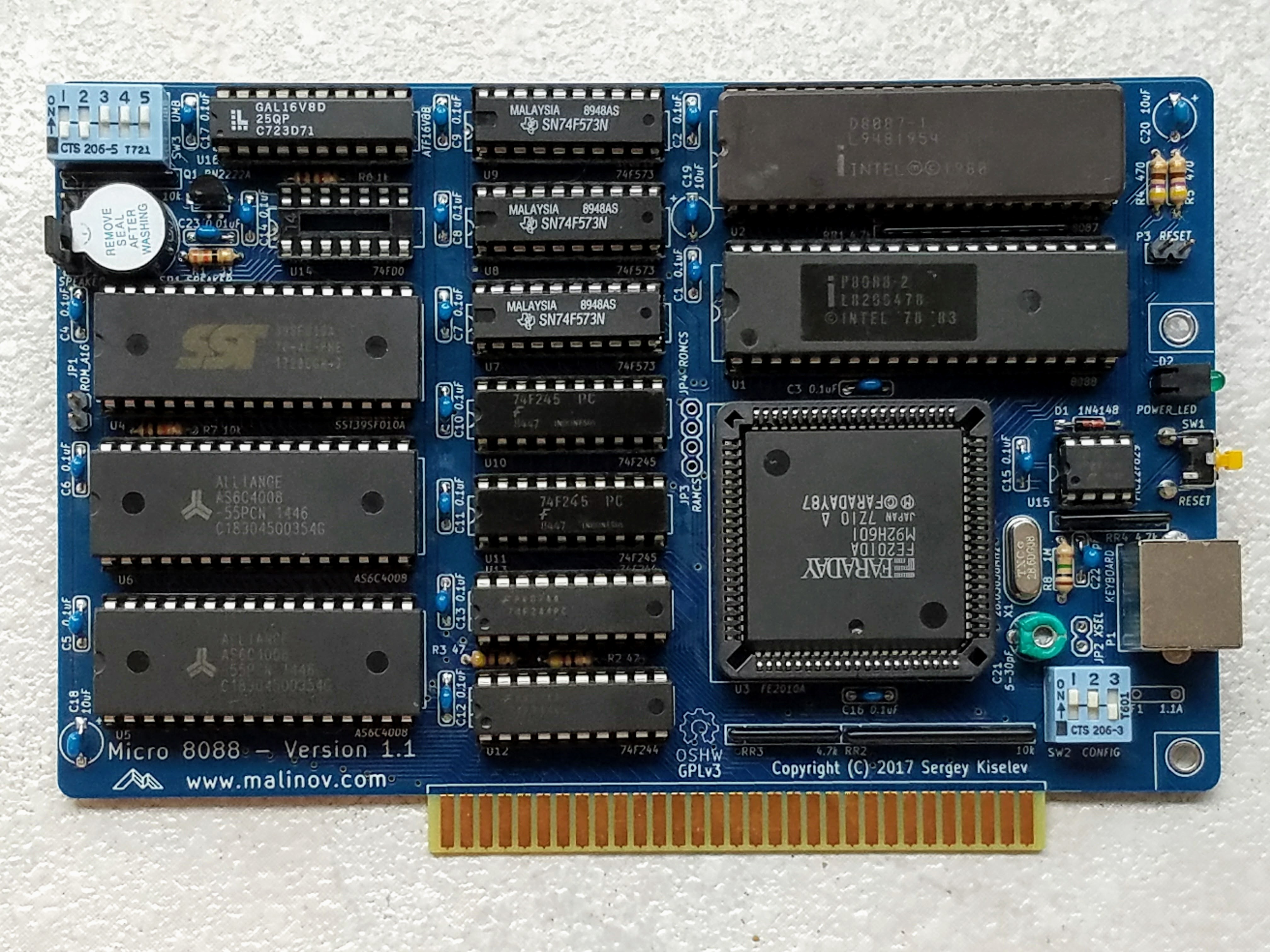So I’ve decided to take a break from the radio stuff again and I am going to be building an IBM PC clone system using a modern kit. Sergey’s 8088 boards create a clone of the original PC using some more modern components that are easier to source (there are still a few old things in there). It is not an emulator or some modern FPGA; it is truly an 8088 system.
Micro 8088 (this is the one I will be discussing) :

Xi 8088 (this is the more complex alternative) :

The board is a fair bit better than the original IBM PC in that it uses a chipset like modern computers do. This makes the project a lot simpler to build because there are much less extraneous chips. It uses a Faraday chipset FE2010A which can still be purchased on eBay. The rest of the components can be sourced on mouser or digikey, except the CPU which comes from eBay also. This kit supports the NEC V20 which is an improved version of the 8088 supporting 9.55 MHz CPU speed and a few extra instructions from the 286. The original PC was only 4.77 MHz. The board can also be set to this slower frequency for older programs that did not have a speed sensing feature (and run way too fast on higher speed CPUs).
The system should support older DOS programs, but it’s not powerful enough for games like Doom. It can handle King’s Quest 1-4 pretty well and maybe even 5-6 with some lag, we will see. It should also support QBASIC and VBDOS which is what I am mainly excited about because QBASIC was how I first learned to program. I didn’t even know what programming was when I first loaded it up. I was just messing around on my mom’s computer, but when I realized what it was, I got obsessed and ended up making a few games and a math practice program for my younger brother that was currently learning his times tables. It would be incredibly cool (in a nerdy way) to run my own programs on my own system built from scratch, so this is my goal. It may not be fast enough, however…
There are a couple videos on youtube of people building this kit, but my aim is to get the clock speed as high as possible. I also ordered a PCB for Sergey’s (the designer of the board) other kit, the Xi 8088 which is a much more full featured version of this that allows much more extensive overclocking. The NEC V20HL CPU is the fastest in this class, allowing a clock speed of 16 MHz, which should be enough to run my programs. However, in order to run this CPU at full speed, an adapter called the PC Sprint will have to be used. This board creates a separate clock generation chip for the CPU so that you don’t have to overclock the whole board just to speed up the CPU. This is important because this board and the ISA bus is not designed for much more than 10 MHz.
So when it arrives, I’ll build the Micro 8088 and see how it performs and then I’ll build the Xi 8088 if I am unable to reach 16 MHz. See, the CPU is actually designed for that frequency, it’s just that the board does not support it. Hopefully the adapter will work.
If this goes well, I may purchase some more PCBs from China and offer this as a kit for sale. The problem is that right now, you can only purchase the PCBs on eBay or from OSH Park at an inflated cost and there are no kits available with the parts included. You have to source all the parts and PCBs yourself. So if there is interest (which I doubt LOL), then I will provide these kits given that I am able to make it work.
I may also do a video on this project for TI. Something like, “Extreme overclocking the original PC clone” might get some attention. I think it’s really fun cause you always see people overclocking new hardware, but what about pushing the original PC to its limit?
OK, here are all the relevant links:
https://github.com/skiselev/micro_8088
http://www.malinov.com/Home/sergeys-projects/xi-8088
https://www.ebay.com/usr/fmv.electronics1
https://ctrl-alt-rees.com/2020-03-02-overclocking-the-ibm-5150-8088-cpu-with-pc-sprint.html